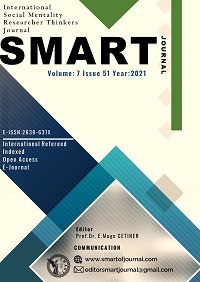Author :
Abstract
Good governance and effective leadership are intertwined concepts. Good governance and leadership are essential for achieving results. It is frequently stated that no country can progress beyond the level of its leadership. Somalia's predicament in aspects of underdevelopment and corruption can be attributed to a lack of leadership and governance. Somalia requires committed leaders who will govern with integrity and relentlessly influence the country's human and natural resources toward the realization of long-term national development. This paper is descriptive it looks at the place of effective leadership and good governance in Somalia. And also this paper recommends that effective leadership must be recognized and people should be given full and sufficient opportunity to learn about leaders and elect them in elections. Finally, democratic processes should be adopted as soon as possible when deciding on effective leadership, with good governance as the goal, and gender equality should be maintained.
Keywords
Abstract
Good governance and effective leadership are intertwined concepts. Good governance and leadership are essential for achieving results. It is frequently stated that no country can progress beyond the level of its leadership. Somalia's predicament in aspects of underdevelopment and corruption can be attributed to a lack of leadership and governance. Somalia requires committed leaders who will govern with integrity and relentlessly influence the country's human and natural resources toward the realization of long-term national development. This paper is descriptive it looks at the place of effective leadership and good governance in Somalia. And also this paper recommends that effective leadership must be recognized and people should be given full and sufficient opportunity to learn about leaders and elect them in elections. Finally, democratic processes should be adopted as soon as possible when deciding on effective leadership, with good governance as the goal, and gender equality should be maintained.
Keywords
- Ake, M., & Olowojolu, O. (2016). Governance and the Challenges of Leadership in Nigeria. Faculty of Law,
- Ake, M., & Olowojolu, O. (2016). Governance and the Challenges of Leadership in Nigeria. Faculty of Law, Arts and Social Sciences, 7(7.1), 1–18. Retrieved from http://eprints.lmu.edu.ng/633/.
- Bolden, R. (n.d.). African Leadership : Surfacing New Understandings through Leadership Development, 9(April 2009), 69–86.
- Folarin, S. (2013). Africas leadership challenges in the 21st century: A Nigerian perspective. African Journal of Political Science and International Relations, 7(1), 1–11. https://doi.org/10.5897/AJPSIR09.055.
- Issa, S., & David, K. (2012). The Challenges of Leadership and Governance in Africa. International Journalof Academic Research in Business and Social Sciences, 2(9), 2222–6990. Retrieved from www.hrmars.com/journals.
- Johnston, M. (2009). Good Governance : Rule of Law, Transparency, and Accountability, 1–34.
- Khwaja, A. I. (2004). Is increasing community participation always a good thing? Journal of the European Economic Association, 2, 427-436.
- Lord, P., Martin, K., Atkinson, M., & Mitchell, H. (2009). Narrowing the gap in outcomes: what is therelationship between leadership and governance?, 8. Retrieved from http://www.nfer.ac.uk/publications/other-publications/downloadable-reports/narrowing-the-gap-in-
- Matt Andrews, “The Good Governance Agenda: Beyond Indicators without Theory,” Oxford Development Studies, vol. 36, no. 4 (December 2008): 379–407. 27
- Menkhaus, K. (2007). Governance without Government in the Politics of Coping. International Security, 31(3), 74–106.
- Poncian, J., & Mgaya, E. S. (2015). Africa’s Leadership Challenges in the 21st Century: What Can LeadersLearn from Africa’s Pre-Colonial Leadership and Governance? International Journal of Social Science Studies, 3(3). https://doi.org/10.11114/ijsss.v3i3.710.
- Sheikh, A., Ali, A., Elmi, H. O., & Mohamed, A. I. (2013). The Effect of Leadership Behaviours on StaffPerformance in Somalia. Educational Research International Educational Research International EducationalResearch International Educational Research International ISSN-L, 2(2), 2307–3713. Retrieved from www.savap.org.pk%5Cnwww.erint.savap.org.pk.
- Sirker, K., Cosic, S. (2007). Empowering the marginalized: Case studies of social accountability initiatives in Asia. Washington, DC: World Bank Institute.
- Skinner, E. P. (1998). African Political Cultures and the Problems of Government. Africa Studies Quarterly, 2(3), 17–25.
- Soludo, C. C. (2007). Creating Effective Governance and Leadership for Sustained National Prosperity.
- Systems, I. (2010). People ’ s Participation for Good Governance : A Study of Rural Development Programs in Bangladesh Date :
- Ukaegbu, C. (2010). “Nigeria; Beyond Good Governance at 50.http://www.allafrica.com/stories/20100628063.htmlThe World Bank Institute Leadership Development Program. (2007). Background Notes on Leadership. Development.
- World Bank Institute (2007), Background Notes on Leadership The World Bank Institute LeadershipDevelopment Program, the International Bank for Reconstruction and Development / the World Bank 1818 H Street, N.W. Washington, D.C. 20433, U.S.A
- Zastrocky & Schilier (2000), “The Higher Education CIO in the Twenty First Century” EDUCAUSEQuarterly, 2000, 23(1), 53, 59. Retrieved online on January 23,2013fromhttp://www.worldbank.org/wbi/governance/pdf/21_Governance_and_Corruption_Kaufm ann.pdf.
